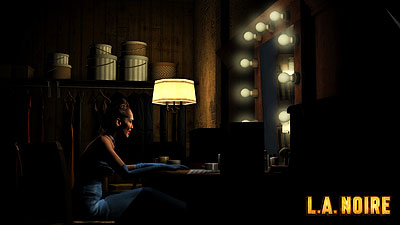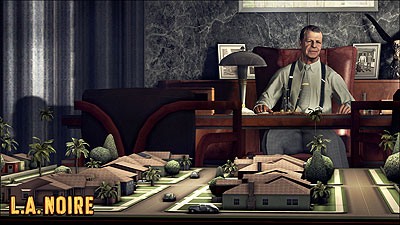Love, Death, And Tragedy: L.A. Noire
Published on June 8th, 2011 in: Current Faves, Game Reviews, Gaming, Reviews |By Paul Casey
L.A. Noire, released by Rockstar Games on May 17, carries on the grand tradition of the adventure game but does so within an impeccably crafted, open-world vision of 1940s Los Angeles. Its narrative is linear; it does not branch off, resulting in those malformations of character seen in Fable or Fallout. Simplistic questions of morality are not used as a choice between different powers and abilities. Overall, L.A. Noire is an experience unique to its medium and sets a new standard in both writing and performance.
Last year’s Red Dead Redemption showed the direction in which Rockstar, best known for the Grand Theft Auto series, is heading. While thoughtful, immaculately realized worlds have always been a staple of their work, their ode to the Western achieved a sincerity from which they had long shied away. Tragic and beautiful things were allowed to occur. No longer did Rockstar require the safety of comedy to disguise their ambitions.
It is appropriate then, that L.A. Noire, developed by Australian outfit Team Bondi, should be released under their umbrella. Its cast of characters are as well written as any that have appeared in a videogame.
There are some, with misplaced confidence, who will undoubtedly say, “That is no achievement!” The reaction to a game like L.A. Noire is a good indicator of the disparate camps within the “videogame community.” There is a cynicism around any game attempting a narrative or emotional connection beyond the acceptable slew of thick-headed machismo and cock-swinging plots which have come to define the story landscape of the medium.
Last year’s Heavy Rain was plagued by issues of both writing and performance quality. Yet it was abhorred by a section of the gaming community, not for these problems, but for being different from the army kill squads and dirt-bike stunts that occupy this masochistic group’s regular playtime. Such self-loathing in gaming culture is to be expected as the medium develops, just as it was with comic books. The thought that one could some day be outpaced intellectually by a videogame is surely a scary one to those who shun all other forms of higher creativity in fear of the lazy, but often quite true, accusation of “You just don‘t get it, do you?” It is less surprising that otherwise intelligent, talented people like Roger Ebert, are so dismissive of videogames when the medium is cursed with such a juvenile level of discourse and understanding.
L.A. Noire requires something in which some are unwilling to invest: imagination. Sure, the world is immense in its detail and visual beauty and the performances are a significant step forward in the relationship between the actor and the videogame. Yet what Team Bondi have truly excelled at here is in creating a world into which the player can take on the role of the detective. Aaron Staton, who portrays Cole Phelps, is integral to this. As you follow him on his journey through a corrupt and poisonous LAPD, and wish for him to be as good as he knows he can be, you experience a symbiosis only available in the videogame medium.

You are called on to care about what you are doing. This gets to the center of something which has long caused undue befuddlement within the gaming press. Surely the way to pose enlightening questions of morality and of the fragility of life and love is to, ya know, give characters a HUNDRED branching paths: “Dude, if you do this evil thing then your character will look more evil.”
As with the sublime Bioshock, the goal should not be to artificially dangle new outfits and powers to encourage the player to play one “evil” game and one “good” game. It should be to force players to confront themselves and how they have impacted the game world. If you begin this game with a boorish and cynical demeanor, you’re failing in what this game requires of you: to be this character.
L.A. Noire shows brutality against the helpless, the loners, and the outsiders, and compels you to make a change, to help in some small way. For even in its most linear shape, the basic nature of the videogame ensures that you are an integral part of the creative experience.
In one Homicide case, you investigate the murder of a homeless woman. Her beautiful clothes are now tattered and ruined from years of wandering and alcoholism; her face is bludgeoned beyond recognition. When you go to interview her only friend in the world, you see his face collapse in sorrow. His world will never be the same. As you leave, he asks you to find her killer. When he says, “She never hurt anyone except herself,” you know it’s true.
The performances here are leagues above anything seen in a videogame. John Noble, who you may recognize from Fringe and as Gondor’s tragic caretaker in Return of the King, is particularly impressive. Dangerous flares of temper, violence, and hatred move the player in ways which an animator never could, as do the subtle twitches and displays of regret and desperation. It so happens that this incredible use of motion capture cameras is key to the central gameplay.
Each case begins with clue gathering. You visit the scene of the crime and gather as many objects of interest as you can, thus opening up new leads. Through the course of your investigation, you will have cause to interview many suspects, whether in their homes, on the streets, or back at the police station. Your questions rely on how much evidence you possess to tie the suspect to the crime. Following each response, you choose Truth, Doubt, or Lie. By reading the face of the person across from you, and by weighing up the evidence and the motive, you choose how to proceed.
It is here that L.A. Noire does most of its work. It is a beautiful, high budget, intelligent development of the old school Lucasarts adventures. It is not as easy as it first appears, and it is possible to fail. If you’ve arrested the wrong person, it becomes apparent at the end of a case in your rating and the response from your superior. Again, this doesn’t cause the game to branch off or the story to alter, except in these moments. It is occasionally confusing as to which option is the correct one, but once you become accustomed to the game’s logic, and the ever-present need for the player to succeed or fail, it becomes second nature.

The other part of the game is comprised of shoot-outs, car chases in beautiful vintage cars, and tailing suspects on foot. The shooting is a satisfying, if simplistic, diversion and as with every other part of this game, serves the story and the characters. There are two particularly memorable action sequences near the end of the game in which shotgun blasts have never felt so much like justice. The driving sections will be familiar to players of Rockstar’s catalogue and as such, are prone to their kinks. Again however, spend some time with it and you should not have too much trouble. For those less adept at the more traditional game skills, driving duties can be given to your partner and action sequences can be skipped altogether. All take advantage of the Rockstar Open-World style.
True, there aren’t as many things to keep you occupied outside of the story as there were in Red Dead Redemption or GTA IV. There are 40 street crimes, which are mostly short and sharp, though some have humorous and sad callbacks to earlier cases. There are also landmarks to see and collectibles to obsess over before finally giving in and looking up a guide. The world is ever-present, and you can get to the next location at your own discretion; both are important factors in immersing the player in this truly Noir experience.
And what of it? Is the story a mess of plagiarism? Only as much as Body Heat was of Double Indemnity or L.A. Confidential was of Chinatown. Those who claim that Brendan McNamara—the writer and director of L.A. Noire—is not the equal of Robert Towne or James Ellroy, seem unusually proud to be stating the obvious. L.A. Noire is not the greatest Noir story ever told, but it is a compelling one. It is a tale of power and abuse, of love and the sacrifices that even the most damaged people can make. And as an overall experience, it will perhaps be seen as the equal of The Maltese Falcon or The Big Sleep in the coming years, inspiring others to build on its creative and technical achievements.
Make no mistake, there will be more games like L.A. Noire. For those who are confused as to what a videogame can be, this may be a negative. For those who fail to see that this is the sign of a medium beginning to reach its maturity, this may also be a negative. For everyone else though, the knowledge that this high point in narrative can be maintained and improved is exciting.
L.A. Noire does not want to be a film. It desires to be a videogame, one that expands the definition of what can be explored and experienced, the things that pass through all mediums: Love, Death, and Tragedy.

Time limit is exhausted. Please reload the CAPTCHA.